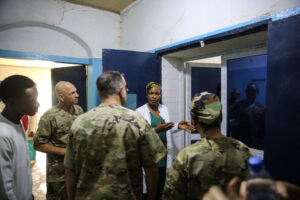
Story by Maj. Edward McBride
U.S. Army Southern European Task Force, Africa
N’Djamena, CHAD—Soldiers from the 402nd Forward Resuscitative Surgical Detachment (FRSD), a part of the 3rd Medical Command Deployment Support, a U.S. Army Reserve unit from Fort Devens, Mass. will join forces with Chadian Armed Forces [Forces Armées Tchadiennes] military medical professionals over the next fourteen days to foster bilateral exchanges of cultural knowledge and medical expertise during the Medical Readiness Exercise (MEDREX).
This fourteen-day event will have approximately 20 American Soldiers paired with Chadian military medical professionals working together in various medical specialties including: general surgery, orthopedic surgery, nursing, pharmaceutical operations, triage, administration and technical services. The event will take place at Garnison Hospital, in N’Djamena, Chad, from June 12-26, 2024.
These partner-led, U.S. enabled exercises are jointly planned between the host nation and U.S. Army Southern European Task Force, Africa (SETAF-AF).
Since 2017 there have been over 39,000 patient encounters across the African continent during the medical readiness exercises. MEDREXs allows military health professionals from the U.S. and our African partners to exchange medical practices, procedures and techniques that build and strengthen treatment capabilities, resulting in lasting relationships.
Capt. Jeffery Sparda, a SETAF-AF MEDREX planner, described the MEDREX as “a phenomenal way for us to show partnership, support to the host nation, [and] for us to build our relations. Really, it’s a great way for us to do so because it also benefits the local population.”
Aside from the shared medical exchange, the MEDREX afford U.S. troops a unique opportunity to directly assist and treat Chadian citizens. Last year during the Chad MEDREX there were a total of 481 patient encounters between triage, radiology, wound care, anesthesia, and operative cases. This year the U.S. has committed up to $30,000 in medical supplies for the Chadian MEDREX.
Capt. Gary Senecal, 402nd FRSD commander, expressed how fortunate and grateful he is to have this opportunity to work with Chadian partners during this medical exchange. He also stated, “intellectually and technically the point of this exercise for his team is to learn as much as they can from the Chadians and offer as much as they can [back] to the Chadians during the next fourteen-days.”
MEDREXs support the U.S. strategic objective of promoting peace and security in Africa by ensuring that both U.S. and partner nation medical teams are prepared to respond effectively to health crises.